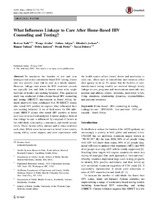What influences linkage to care after home-based HIV counseling and testing?
Date
2017Author
Naik, Reshma
Zembe, Wanga
Adigun, Fatima
Jackson, Elizabeth
Tabana, Hanani
Jackson, Debra
Feeley, Frank
Doherty, Tanya
Metadata
Show full item recordAbstract
To maximize the benefits of test and treat
strategies that utilize community-based HIV testing, clients
who test positive must link to care in a timely manner.
However, linkage rates across the HIV treatment cascade
are typically low and little is known about what might
facilitate or hinder care-seeking behavior. This qualitative
study was conducted within a home-based HIV counseling
and testing (HBHCT) intervention in South Africa. Indepth
interviews were conducted with 30 HBHCT clients
who tested HIV positive to explore what influenced their
care-seeking behavior. A set of field notes for 196 additional
HBHCT clients who tested HIV positive at home
were also reviewed and analyzed. Content analysis showed
that linkage to care is influenced by a myriad of factors at
the individual, relationship, community, and health system
levels. These factors subtly interact and at times reinforce
each other. While some factors such as belief in test results,
coping ability, social support, and prior experiences with
the health system affect clients’ desire and motivation to
seek care, others such as limited time and resources affect
their agency to do so. To ensure that the benefits of community-
based testing models are realized through timely
linkage to care, programs and interventions must take into
account and address clients’ emotions, motivation levels,
living situations, relationship dynamics, responsibilities,
and personal resources.

